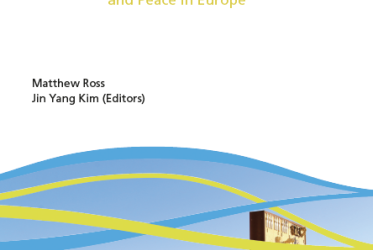"Church & country profiles" for several countries have been developed by the WCC Europe desk ahead of the 2006 assembly. Please note that these profiles are intended to serve as general references, and do not represent official policy positions of the World Council of Churches. The WCC strives to maintain accuracy in its information, but cannot be responsible for any mistakes or outdated information.
The place of Europe in the broader reality of the World Council of Churches (WCC) is unique: it is the region in which the ecumenical movement was founded, and in which the WCC is organizationally based. It is also a region which offers an immense diversity of both cultural and political life, and of church and religious experience. Central and Eastern Europe (CEE), is as much a concept as a geographical definition, and, as with other definitions, it has cultural and political overtones. Changing borders and geopolitical configurations in the area have confused the usage of terms such as Central, Eastern and indeed Western Europe. For the purposes of this profile, the region is broadly defined as including all the 27 former socialist countries, in almost all of which WCC has European member churches.
An extraordinary decade
The political changes which swept through Central and Eastern Europe after 1989 liberated millions of people from repressive and often violent regimes. The legacy of communism was, for the most part, devastating. Along with economic under-development compared to pre-communist trends, came the confirmations of massive human rights violations, enormous environmental devastation and, less visible, profound psychological disorientation or even trauma for many people.
For many churches, the magnitude of these events was of more than simply historical importance. As the Catholic Special Assembly for Europe of the Synod of Bishops (1991) said, "In the light of faith and prompted by the Holy Spirit, we would like to discern in the present moment genuine signs of God's presence and purpose ( ) These events demonstrate a genuine kairos in the history of salvation, and they offer an immense challenge to carry on God's renewing work, on which the fate of nations ultimately depends."
Major trends in the region
The events after 1989 should be placed in a broader context. During the course of the 20th century, the CEE region has experienced revolution and upheaval on an unprecedented scale. The communist regimes which took power following WWII introduced oppressive systems of social and economic control. The revolutions that shook Central and Eastern Europe after 1989 surprised many. However, the changes found few prepared to assume the challenges and transformations that the new era would introduce. The decade has undoubtedly been a period of unprecedented freedom, but also of upheaval, of change, and even of disintegration for Central and Eastern European societies - the "other half" of Europe. The number of independent countries in the region has doubled since 1991 - excluding the emerging new entities in Kosovo or in the North Caucasus.
The end of the Cold War, and the enlargement eastwards of NATO and the European Union in 2004, are leading to profound changes in the political and security arrangements on the continent. Political transition has usually been marked by a general move to democracy. In general, Central Europe has experienced greater political and social stability than have the former Soviet Republics. The breakup of federal states (USSR, Yugoslavia), and the renewal of national identities in many parts of Europe, increases the risks of inter-ethnic conflicts. Of the ten violent conflicts in Eastern Europe and the Balkans since 1990, the majority appears to be along Christian-Muslim historical fault-lines.
The period of transition since 1989 has had a significant socio-economic impact on all the countries of Central and Eastern Europe, and the effect has varied considerably. According to UNDP, this region has undergone the sharpest welfare reversals of any region in the world during the last decade, and most countries have experienced unprecedented poverty and mortality increases. 40-70 years of centralized planning and economic mismanagement has made the transition more painful in the CIS countries. The socio-economic collapse in Central and Eastern Europe and the subsequent unprecedented welfare reversal has increased poverty, reduced access to education, and together with the resulting social tensions and conflict, stimulated forced migration in many parts of the region, and a rise in xenophobia.
Major ecumenical issues in the region
WCC has an important constituency in the Europe region. There are 81 member churches in the Europe region, including associated member churches (second only to the Africa region), 25 of which are in Central and Eastern Europe. Over half of WCC's constituency, measured in people, is located in Europe, of which the majority is in the Central and Eastern Europe region. The largest WCC member church, and the largest national church in the world, is the Russian Orthodox Church, and the great majority of WCC member church constituencies are Orthodox in this region, with an estimated 127 million members in Central and Eastern Europe. There are also sizeable Protestant member churches in Romania, Hungary, Slovakia, the Czech Republic and the Baltic countries.
Many churches in the Eastern Europe region have undergone an unprecedented religious revival, measured in the huge increase of baptisms in the early 1990s, the reconstruction of churches and restoration of religious activity. In Russia alone, over 20,000 new Orthodox parishes have been opened in the last ten years, and religious practice has increased in all countries except the Czech Republic and former East Germany.
The decline of traditional churches in Western Europe, and the simultaneous growth of new religious movements, is accompanied by examples of a spectacular religious revival among churches throughout Eastern Europe after the fall of communism, with renewed tensions in many countries between majority traditional churches, and new or minority churches. The massive arrival of mainly neo-Protestant missionaries in many countries has in some cases exacerbated inter-church tensions. In some contexts, the connection of identity and faith has led to religion being used as a banner of national and ethnic identity, and has led to concern about "religious conflict".
Local ecumenism and church unions remain strong, primarily in Northern and Western Europe. In the East, renewed confessional identities and fundamentalist trends have led to tensions between majority and minority churches, and a challenging of institutional ecumenical commitment, especially within the Orthodox churches. There are only five official National Councils of Churches (NCCs) in the region of Central and Eastern Europe, although there are other forms of inter-church and inter-religious bodies.
The importance of the church has grown, and its visibility and moral authority in society has been significant across the region. The social and educational response of churches have also developed significantly, as communities have moved beyond the imposed limitations of the worship community, and have initiated and renewed social actions, usually at the local level, in response to immediate needs and demands. However, the long-term role of the churches in welfare provision and the relationship to the state and other social actors remain unclear. The role of churches in their relationship to the state also remains a complex, and at times conflictual, issue for the churches in Central and Eastern Europe.
WCC's programmatic involvement in the region
The WCC and other international ecumenical organizations sought to respond to the new and unprecedented situation in this region in a number of ways. Immediately following the changes, the WCC sought to engage with its member churches to analyze and dialogue on important challenges, and to develop common responses.
Immediately after the changes in 1989, a series of ecumenical team visits, dialogues and consultations were arranged with churches in the region. Already in 1990, WCC member churches were expressing their hope about the new situation, but also admitting anxiety about the expectations they faced from society. "In the face of the dramatic changes, which have given rise to anxiety and resignation on the one hand, and have created utopian expectations on the other, the churches are committed to a biblical understanding of the human condition and to the proclamation of the Gospel as the only true source of renewal in the lives of individuals and societies."
WCC, with related church agencies, undertook a number of new programmatic initiatives with the churches in this region over the past decade. The work has been organized from WCC in Geneva, with the appointment of consultants and the formation of programmatic offices according to need. The main capacity has been concentrated in the Europe Desk in Geneva, with a WCC Eastern Europe Office focusing on the CIS countries since 1994, and later with special consultants placed in the Balkans. Round Table programmes have engaged with the churches and their priorities in numerous countries of this region, and multiple projects, exchanges, publications and networks have been facilitated with the involvement of the WCC.




